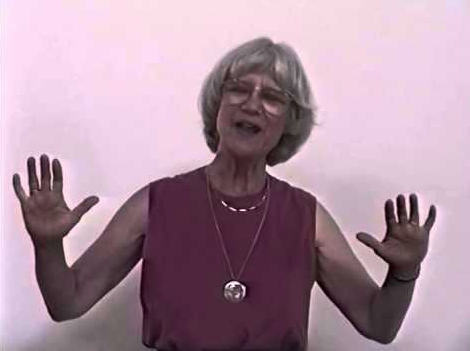This Moment: an interview with Toni Packer by Michael Stone
Toni Packer: I don’t use the word practice at all. I dropped it after leaving the Zen Centre because it’s so weighted down with “practice makes perfect.” You have to “practice.” What is your practice? This is all binding. We had to find a word, so I did choose it for my first book, which was “work.” The Work of This Moment I called it. We have not yet come up with anything better. It’s a word to denote what you do to find out about yourself. Your relationship with nature, with each other, with God if that’s what you’re having a relationship to.
Michael Stone: What is the work of this moment?
Toni: The work of this moment is attention, awareness, presence. “I practice presence” is not a very good expression. But to be in presence, to be here and now, that is the best way to characterize meditation. What we do on retreat or at any time, is to be aware, attentive, to be here. It’s not about focusing on this or that, that’s another thing with practice that I felt was misleading because I don’t see it as a focusing, a zeroing in on something like the tip of my nose, or a word, or a sentence, but awareness as a whole, it’s all embracing. It either happens or it is not there, and then you realize what is in the way of being totally open.
Michael: Do you use the words “awakening” or “enlightenment” as one arrives more and more at present experience?
Toni: I don’t use those words because I felt they are often misused. The idea: I have to get enlightenment. Are you enlightened? This is all misleading, as though there was a final state to be arrived, which is not the case. Being here is not a final destination, but are you here now, at this moment? I don’t talk about enlightenment, I don’t even see this as a process. Either you’re here or you’re asleep and unconscious. When that is the case then what is going on, why are you not awake? Then you find out. Is the wind disturbing me? Or: I don’t like this house. I don’t like the way she talks. Is she approving of me? All these things are in the way. Is there anything in the way? If nothing is in the way, then there is nothing to work on, everything is here, nothing is a hindrance. Nothing is disturbing. The disturbance itself is something that’s here, what is it?
Michael: What is the role of language? Not just the language we use to communicate, but the stories I have that obscure my ability to be present.
Toni: What is it about these stories—the attachment to them, the need to elaborate them, the need to let people know your story? Then you feel of importance, of significance. Or can your inner story sink into the background because it’s of no particular importance? If you were to ask me how did I come to Zen, well then I’ll tell you as objectively as I can. Without trying to embellish to make an attractive and interesting story. Just present as simple as possible to tell you the facts. But not to hang onto it and feel “this is my what I am,” this is my story. Because very often we take our stories for what we are, and they are not what we are.
